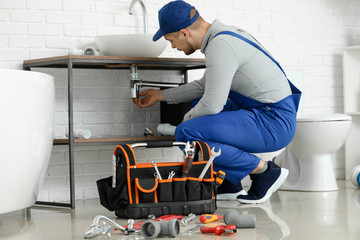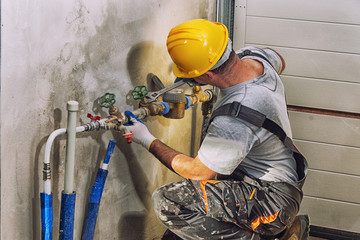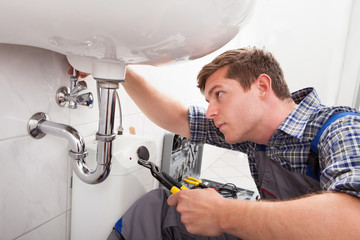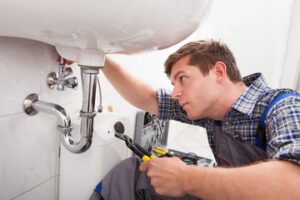Plumber Rosenberg TX plays a crucial role in maintaining the functionality of water systems. Their expertise ensures that water flows efficiently and waste is properly managed. Without plumbers, modern living would face significant challenges. They handle complex systems that require precision and technical knowledge.

Plumbers are responsible for installing and repairing pipes. They work with various materials, including metal and plastic. Proper installation ensures long-term functionality. Poorly installed pipes can lead to leaks and water damage.
Drainage systems are an essential part of plumbing work. Plumbers ensure that wastewater flows away from buildings without obstruction. They use specialized tools to clear blockages and prevent backups. Efficient drainage systems protect the structural integrity of buildings.
Water pressure management is a critical part of plumbing. Plumbers install and adjust pressure regulators to prevent pipe damage. Excess pressure can cause leaks and burst pipes. Proper pressure control ensures a consistent water supply.
Fixture installation requires technical expertise. Plumbers install sinks, toilets, and showers with precision. Leaks often stem from poor installation or worn seals. Professional plumbers ensure secure and lasting connections.
Hot water systems are installed and maintained by plumbers. They ensure consistent water temperature and efficient heating. Proper insulation reduces heat loss and energy costs. Regular maintenance extends the lifespan of heating systems.
Plumbers also work with water filtration systems. These systems improve water quality by removing contaminants. Proper installation ensures effective filtration. Regular filter replacement maintains performance and safety.
Leak detection is a key skill for plumbers. They use specialized tools to identify hidden leaks. Early detection prevents water damage and high utility bills. Professional plumbers address leaks promptly and effectively.
Plumbing maintenance involves regular inspections and repairs. Plumbers check for wear, corrosion, and blockages. Timely maintenance prevents costly repairs and system failures. Preventative care enhances system longevity.
Backflow prevention is essential to protect water quality. Plumbers install backflow valves to prevent contamination. Backflow testing ensures compliance with safety standards. Proper prevention measures safeguard public health.
Frozen pipes pose a threat to plumbing systems. Plumbers insulate pipes to prevent freezing in cold weather. Burst pipes from freezing can cause extensive damage. Preventative measures protect against costly repairs.
Ventilation systems are installed and maintained by plumbers. Proper ventilation prevents sewer gases from entering buildings. Vents also maintain air pressure within the drainage system. Professional installation ensures balanced ventilation.
Sewer line repair and maintenance require specialized skills. Plumbers clear blockages and repair damaged pipes. Tree roots and debris can obstruct sewer lines. Professional equipment ensures effective repair and maintenance.
Rainwater collection systems are installed by plumbers. These systems capture and store rainwater for reuse. Filtration ensures safe and clean water for non-potable use. Proper installation enhances system efficiency.
Plumbers work with greywater systems for water recycling. Treated greywater is used for irrigation and flushing. Proper filtration ensures safety and functionality. Greywater systems reduce overall water consumption.
Pressure relief valves are installed to protect pipes from over-pressurization. Excess pressure can rupture pipes and damage fixtures. Relief systems release pressure gradually. Proper calibration ensures balanced pressure.
Expansion tanks are used in closed water systems. They absorb pressure changes caused by thermal expansion. Proper tank sizing enhances system efficiency. Plumbers ensure correct installation and maintenance.
Smart plumbing systems are becoming more common. Plumbers install sensors and automated controls. These systems monitor water usage and detect leaks. Smart technology improves efficiency and prevents damage.
Flexible piping allows for easier installation. Bendable materials simplify routing around obstacles. Reduced joint requirements minimize leak risks. Professional plumbers ensure secure and lasting connections.
Pipe joint sealing prevents leaks and pressure loss. Threaded connections and sealing compounds enhance durability. Corrosion-resistant materials improve longevity. Proper sealing techniques ensure reliable performance.
Plumbing retrofitting updates old systems. New materials improve performance and durability. Retrofitting enhances compliance with modern codes. Professional installation ensures compatibility and reliability.
Grease traps are installed to prevent drain blockages. Plumbers install and clean traps regularly. Grease buildup can obstruct flow and cause backups. Proper maintenance ensures consistent drainage performance.
Plumbing material selection impacts system longevity. Metal and plastic options offer different benefits. Professional assessment ensures suitable material choice. Proper installation enhances material durability.
Water-saving fixtures improve conservation efforts. Plumbers install low-flow faucets and toilets. Efficient fixtures reduce water usage without compromising performance. Conservation-focused plumbing lowers utility costs.
Acoustic monitoring detects hidden leaks. Sound sensors identify water flow anomalies. Early detection minimizes repair costs. Acoustic systems enhance leak prevention strategies.
Trenchless pipe repair reduces excavation and repair time. Plumbers insert new linings into damaged pipes. Trenchless methods minimize disruption to property. Durable materials improve pipe longevity.
Plumbers handle emergency repairs effectively. Burst pipes and leaks require immediate attention. Fast response minimizes water damage and repair costs. Emergency services ensure system reliability.
Plumbing maintenance contracts provide consistent service. Professional inspections identify potential issues. Scheduled maintenance prevents system failures. Contracts ensure reliable long-term performance.
Plumbers install water softening systems to reduce mineral buildup. Hard water deposits restrict flow and damage fixtures. Softening systems extend the lifespan of plumbing components. Balanced mineral levels improve water quality.
Plumbers install and maintain sump pumps in basements. Pumps prevent flooding during heavy rain. Proper installation ensures consistent operation. Regular maintenance enhances pump reliability.
Cross-connection control prevents contamination. Plumbers install physical barriers and check valves. Regular testing ensures compliance with safety codes. Effective control safeguards public water systems.
Anti-scald devices protect against temperature fluctuations. Thermostatic valves maintain consistent water temperature. Safety controls prevent sudden heat surges. Proper calibration ensures user comfort and safety.
Plumbing ventilation systems maintain air pressure balance. Vents prevent sewer gas from entering buildings. Proper vent placement ensures smooth drainage. Professional plumbers adjust vents to maintain efficiency.
Water pressure regulators are installed to prevent pipe damage. High pressure can cause leaks and burst pipes. Regulators balance pressure for consistent flow. Proper adjustment ensures system stability.
Plumbers work on underground plumbing systems. Proper depth and insulation protect against soil movement and freezing. Corrosion-resistant materials enhance durability. Accurate mapping prevents accidental damage.
Plumbers use camera inspection to identify hidden issues. Cameras provide a clear view of pipe interiors. Early detection allows for targeted repairs. Inspection technology improves diagnostic accuracy.
Drain traps prevent sewer gases from entering buildings. Water-filled traps create a barrier against odors. Proper installation ensures consistent seal maintenance. Regular cleaning prevents buildup and blockages.
Plumbers ensure compliance with building codes. Plumbing codes establish safety and performance standards. Inspections verify adherence to regulations. Updated codes reflect technological advancements and environmental concerns.
Plumbers play a vital role in water conservation. Efficient systems reduce water waste and utility costs. Professional plumbers recommend water-saving fixtures and practices. Conservation efforts enhance environmental sustainability.
Pipe slope affects drainage efficiency. Proper angles ensure smooth wastewater flow. Insufficient slope causes standing water and blockages. Professional installation ensures optimal slope design.
Plumbing zoning allows for independent control of different areas. Separate zones optimize water usage and pressure. Individual shut-off valves enable targeted repairs. Zoning enhances system flexibility and efficiency.
Plumbers handle both residential and commercial systems. Residential plumbing focuses on home water needs. Commercial plumbing involves complex systems and higher usage. Professional plumbers adapt to different system requirements.
Plumbers are essential for modern living. Their expertise ensures efficient water flow and waste disposal. Professional installation and maintenance prevent costly repairs. Reliable plumbing systems enhance comfort and safety.





